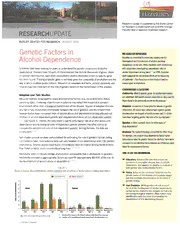
Research Update (2001 August): Genetic Factors in Alcohol Dependence PDF
Preview Research Update (2001 August): Genetic Factors in Alcohol Dependence
HaZeLDeN Research Update is published bythe BUtler Center for Research to share significantscientific findings from the field ofaddiction treatment research. BUTLER CENTER FOR RESEARCH AUGUST 2001 Genetic Factors in THEHAZELDENEXPERIENCE Alcohol Dependence Hazelden iscommittedtoadvancingresearchonthe developmentandtransmissionofalcohol anddrug dependence. Inthelate 1980s,Hazeldenstaffcollaborated Scientists have been workingforyears to understand the genetic componentofalcohol with researchersinvestigatingconcordanceratesof dependence. Humans have 23 pairs ofchromosomesthat include thousandsofgenes. Areas alcoholdependenceamongtwins. In 1999, Hazelden “ on several chrurnosomes have been implicated in alcohol dependence but no specificgene staffsupportedtherecruitmenteffortsoftheUniversity has been found. Findinga specificgene is not likelygiven the complexity ofalcoholism and the ofCalifornia—San Franciscointheirstudyoffamilial way in which multiple genes interact. Research on adoptees and twins, alcohol sensitivity, and transmission inalcoholism. neurobiulogyhas shed light on the role ofgenetic factors in thetransmission ofthis disease. CONTROVERSIES&QUESTIONS Controversy:What/fspecificgenesforalcoholdependence Adoption and Twin Studies areidentified?Willhealthinsurersraiseratesordenycarefor Because relatives livingtogethershareenvironmental factors (e.g. social economicstatus, thosefoundtobegeneticallyatriskforthedisease? parenting style), clusteringofalcoholism in a family may reflectthe impactofa common environment ratherthan a biological transmission ofthe disease. Studies ofadopted children Response: In reactiontothesepotentialabusesofgenetic and twins help researchers differentiate between the role ofgenetics and the environment. information.42stateshaveadoptedlawsagainstgenetic Several studies have compared rates ofalcohol abuse and dependenceamongadopted-out discriminationonthepartofhealth insurersand21 states children ofalcohol dependent parents and adopted-outchildren of non dependent parents havelawstargetinggeneticdiscriminationbyemployers. (see Figure 1). Overall, the data reveal a significantly higher rate ofalcohol abuseand Question:Isthereageneticbasisforothertypesof dependencyamong biological sons ofdependent parents adopted intoother homesas drugdependence? compared to adopted-outsons of non-dependent parents. Amongfemales, the data are inconsistent.’ Response:Theresearchfindingsaresimilarforotherdrugs. Forexample,onestudyofdrugdependencefound higher Twin studies provideanother useful method forestimatingthe role ofgenetics bycalculating concordanceratesforgeneticfactorsforidentical maletwins concordance rates. Concordance rates can vary between 0 (no relationship) and 1.00 (perfect comparedtonon-identicaltwinswhereasnodifferenceswere relationship). Several studies havefound concordance rates are higheramongidentical twins foundforenvironmentalfactors.” than fraternal twins, mostconsistentlyamong men.’ “ ° Heritability refers to the percentage ofalcoholism vLilnerabilitythat is attributableto genetics. HOWTOUSETHIS INFORMATION Heritability estiniates suggestgenetic factors accountforapproximately40-60% ofthe risk for — Educators: Advancethe ideathatalcohol de thedevelopmentofalcohol abuse ordependence.”’°” pendence isa complexdisease, has nosimple explanation, and appearstodevelopasa resultof Figure 1: bothgeneticand environmental factors. RatesofAlcohol abuse/dependenceamongadopteeswith orwithoutafamilyhistoryofabuse/dependence — Policy: Advocateforcontinued research intothe genetic basesofthisdiseaseand promote legisla POSE,,-Far‘j[rOSy ,‘ NegalivaFaeilsirstoJ tionthat prohibitsdiscrimination on the basisof genetictesting. — Care Providers: Whilegeneticsdo notaccount forallofthedevelopmentofalcohol dependence, certainfactors relatedtothisdiseasearetransmit ted amongbiological relatives.Worktoward early identification with thehope ofpreventingthe developmentofthisdevastatingdisease. 900doineici Cion;—retai., CoO,ieioi Ce:,teiai S9.deoIem,I G0io.’.’ii B’netai tO”nneiai., Cn.i:oieti SOa5,.:n’to’ 1973 inS 1557’ 1955’ 1996’ 1977 1685 1681’++ 1685’ i996’ SicSaL. areroundedtoIt—Ieartastalenurnh.r. +,-* AAddoopptteeeessa,oSiIhhhbiiooiioogg,ccaaiiffaarmniiSijhhiissttrc,yrc05impaatteerrnnaaiiaalcicoohhoollaabbuusseel)ddeeppeennddeesncceeoonniyiy.. coNTrSuEDONOACK <CONTINUEDFROMFRONT Genetic Factors in Alcohol Dependence HZLDN m Alcohol Sensitivity There are genetic differences in the way people metabolizealcohol. Some lack an important enzyme. This deficiencyacts like a built-in form ofAntabuseand typically causes flushingand References illness in reaction toalcohol. The responsible gene for this deficiency, designated ALDH2-2, is 1. NatisoalInstitoteenAlcoholAbuseandAlcoholism.128111. located on chromosome 12 and is common amongthose with Japanese or Chineseancestry: V/hydosoioepeopledrinktoonioch? Theroleofgeneticand psAch050cialiatlaeocestOo—line].Asailable:Internet:wtow.niaas.oih. gos/poblicatioos. While increased alcohol sensitivity may providea protectivefunction, reduced alcohol sensitivity 2. Ferood,T..&Li,1’.K.119991.Geneticsofalcoholisor:Areoiewofrecent appears to be related tothe developmentofalcoholism. Peoplewith lowalcohol sensitivitydo studiesinhowanandanimalmodels.AmericanJournalnoAddict/ens, 8,201-270. notfeel the effects ofalcohol as quicklyas others. In one study, 40% of men with an alcohol 3. Cadoret,B.3.,O’Gormao,1’.Vi,Troaghton,E..Heytsood,E.11985). dependent father had lower biological and subjective levels of reaction to alcohol compared Alcoholismandantisocialpersonality.Arc/oresofGenera/Psychiatry 42.181-882. to 10% of men wifhoutan alcohol-dependentparent, even though they had the same blood 4. Cadoret,B.3.,Troughtos,E.,&D’Gorman.T.V/.11987).Geneticand alcohol level. Several years later, 56% ofthe sons with loweralcohol sensitivity became enoironmentalfactorsinalcoholabuseandantisocialpersonality. alcohol dependentwhereas only 15% ofthosewith high sensitivity levels developed this JournalofStodiosonAlcohol,48.1-8. 5. Clsaisger,C.B..Bohisas,Ti.,&Sigsardssss,S.119081.Inheritanceof disease. alcoholabuse.ArchivesofGeseralPsyr/satiy.38,86t-888. 8. Goodwin,0.W.,Schulsioger,F.,Herniaosee,L,etal.(t973/.Alcohol problemsinadopteesraisedapartfromalcoholicbiologicalparents. Neurobiological Research ArchivesofGeseralPsyclnatry,28.238-243. Begleiterand colleagues have completed a variety of brain-viavestudies.’ Theyfound that 7. Signardsson,S.,Bohmas,51,,&Cleeinger,C.0.119981.Replication oftheStockholmadoptionstedyofalcoholism:Confirmatorycross- alcohol dependent individualsare more likelyto have lower levels of brain wave responseto fosteringanalysis.ArchivesofGenera/Psychiatry,53,081-687. certain visual stimuli compared to non-dependent individuals. This difference is known as the 8. Bohmao,M.,Sigsardsson,S.,&Cloninger,C.B.it9ltl.Maternal inheritanceofalcoholabuse.ArchivesofGeneralPsychiatry38, P3 deficit and persists in dependent subjectswho have been abstinentfor up to 10years. 985-989. Although the P3 deficit has been found in both dependent men and women, itappears to be 9. Goodwin,0.W.,Schulsinger,F,Koop,i.,etal.(19771.Alcoholisnr anddepressioninadopted-eatdaeghtersofalcoholics.Archivesof more pronounced among men with family historiesofdependence. GeneralPsychiatry,34,751-755. tO. Pickens,B.Vt..Ssikis,0.5.,McGae,M.,etal.(1991/.Heterogeneity intheinheritanceofalcoholism.ArchivesofGenera/Psychiatry40, Summary 19-28. Evidence existsfora genetic contribution to alcoholism. However, genetics onlyaccountfor40- 11. McGue,M.,Pickeos,H.Vi,&Snikis,OS.1t992l.Seeandageettects ontheinheritanceofalcoholproblems:AtwinstudVJooroalof 60% ofthe variance in alcohol dependence. Clearly, alcohol dependence is a complex problem AbnonnalPsychology101,3-17. that involves interplay befween genetic and environmental f2<actors. 12. Heath,A.C..Bucholo.K.K.,Madden,RA.F,01al.(19971.Gesetic andeooiroomeotalcuotrihatioostoalcoholdependenceriskisa nationaltminsanrple:Cnesistencyotfindingsinwomensodmen. PsychologicalModichie27,1381-1390. 13. Kendler,KS.,Heath,A.C.,Neale,M.C.,01al.(1992).Apopelatioo basedtwiestudyofalcoholismiessnnren.JournalofthoAnrerican MedicalAssociation,2t8,1877-1882. 14. Kendlor,KS.,Pmacstt,C.A.,Neale,M.C.,&Pedersen,N.L11997). TemperanceBoardRegistrationforalcoholabuseinaoatieoal sampleofSwedish saleteensborn1902to1949.Archh’osofGeneral Psychiatry.54,178-184. 15. Prescott,C.A.,Ageo,S.H..&Kendler,8.5.11999).Seodifferences inthesourcesofgeneticliabilitytoalcoholabuseanddependence inapopulation-basedsampleofUStwins.A/cohnhsnr:Chnicaland FsporimentalResearch,23,1130-1144. 16. NationalInstitutesonHealth.(2109).HumanGenamePmiect information[On—line].AsailableInternet:wwci.nchi.nlm.nih.faa. 17. Schackit.N A.11995).Aleng-termstudyofsonsofalcoholics.Alcohol Oealth&ResearchlVonld,19,172-175. 18. Oegleiter,H &Porieso,B.11999).V/hatisinheritedinthe predispositio.n, to’,sardalcoholism?Aproposedmodel.Alcuhohsnr: ChsricatandEsporhsosfatResearctr,23,1125-1135. 19. Pnrfeso,B.,Begleiter,8.,Reich,T.,etal.(19981.Aurplitudeofaisoal P3esent-relatedpotentialnsaphenatypicmarkerforapredisposition toalcoholism:PreliminaryresultsfromtheCOCAprn)ect.A/cohohsei: ChnicatandExporinrentalResearch,22,1317-1323. 28. Fmmerson.8.9.,Dostman,8.E.,Shearer,0.E.,&Chamberlin,H.M. (1987).FFG,sissallyeankedandecentrelatedpotentialsinyoung abstinentalcoholics.Atcuhot,4,241-248. 21. CouncilforResponsibleGenetics.128001.Geneticdiscrimination hazelden.org legislationintheU.S.[On-line].AoailableIntereet:wc,w.gene-wstch. org. 22. Johnson.F.0.,sandenBree.M.RN.,UhI,C.H.,&Pickeos,8.V/. BUTLER CENTER FOR RESEARCH AUGUST 2001 119961.Indicatorsofgeneticandenvironmentalinfluencesindrug abusingindiaiduals.GrogandAtcoholGependonce41,87-23. The BoilerCentertot Reseai’eh intnrnisand improves recoveryservicesaud producesresearch charbenefits the held ofaddicrion rnarnieni.lYearededicated roenndiicungclinical research, cnll,ibor,n;ngsvirh external researchers,and communicatingscientific findings. PatriciaOwen,Ph.D..Director Ityouhavequestions,orwouldliketoreqaestcopiesofResearchUpdate, pleasecall800-257-7800eot.4405,[email protected], orwriteRe4,RO.BooIt,CenterCity,MN 55012-0011. ©2000HooelOe::Fuundoriun <szeiaens’::it:,r,Hazseovr:iocaarerenisrerea see-you: traeemarksuilivHazeiaesFour,ciairsn 0002oa (dO/OSm
